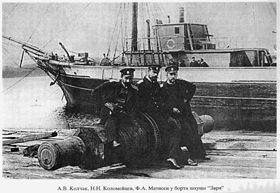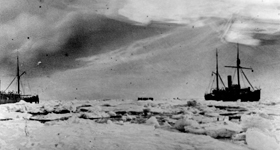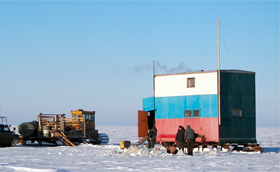Research and innovation in the Arctic
(no votes) |
(0 votes) |
Dr. of Geography, Professor of Economics, Head of the Center for Northern and Arctic Economies
Geographical location no longer automatically makes a country an Arctic power. Becoming a major player in the Arctic requires daily painstaking and persistent work. Research and innovation activities in the Arctic zone are the priority area of efforts. This is what will determine Russia’s retention of control over its Arctic zone in the future.
Geographical location no longer automatically makes a country an Arctic power. Becoming a major player in the Arctic requires daily painstaking and persistent work. Research and innovation activities in the Arctic zone are the priority area of efforts. This is what will determine Russia’s retention of control over its Arctic zone in the future.
Paradoxes and priorities of Russian Arctic research and innovation
The current situation with the Russian Arctic research should be recognized as a paradoxical one. During both the Tsar and Soviet era, Russia was an undisputed world leader in the Arctic research. Suffice it to say that this region’s large-scale economic development began in the USSR thirty or forty years earlier than in other polar countries.
However, Russia lost its leadership in many areas at the beginning of the XXI century. Over the past 15 to 20 years, Russia’s fast-developing polar neighbors made enormous efforts aimed at increasing the level of geological exploration of their Arctic shelf, progressing in understanding climate change patterns in the Arctic, and accumulating ideas on the development of Arctic natural and social systems.
A country with the largest Arctic territory and waters is no longer the leader in any of the new areas of Arctic research.
For now, Russia is critically relying on a powerful research reserve, accumulated in the late Soviet period, when polar researches had an unconditional – particularly due to defense considerations – priority (let’s remember that in the Soviet period, all information relating to the Arctic was classified). Today, Russia is the undisputed world leader in icebreaking fleet, especially in the construction and operation of nuclear icebreakers.
However, the rate at which the international community is accumulating new knowledge about the Arctic is so high (as evidenced, for example, by the Arctic Frontiers annual conferences that are held in Tromso, Norway) that the risk will be increasingly essential if we continue to lag behind. A country with the largest Arctic territory and waters is no longer the leader in any of the new areas of Arctic research. Here lies the dangerous paradox.
Under these circumstances, Russia’s interests in Arctic research can be described as a revival of the best Soviet tradition of complexity and interconnection of various disciplines in the organization of research teams, scientific expeditions, and polar explorations. Russia should be present at all international forums, participate in international research projects, and even initiate such events itself in order to nourish from and acquire new global Arctic knowledge, which has accumulated over the past 15 to 20 years, and is rapidly updated from year to year. Russian experts should be well informed of new concepts, theories, and scientific discussions. It is also worth thinking of reviving the specialty of Northern Studies (“Severovedenie”), whose specialists had comprehensive knowledge of the development mechanism of the polar and northern natural and social processes.
However, these are general considerations. There are specific areas of Arctic innovation that are extremely important for Russia and must be rooted in the Russian soil.
The first priority can be the reconstruction of the utilities infrastructure in the Arctic, which is extremely archaic and has changed very little over the last fifty or seventy years. This infrastructure is, in fact, wasteful, inefficient, expensive, and instable in work. Transition to modern mobile heat and power supply circuits attached to local sources of heating and fuel oil for Arctic decentralized small villages, towns and cities is a priority. It is important here to understand that the ideology of a total centralization of heat and power systems, which was adopted during the Soviet era, objectively has limits under Arctic conditions and needs revision. Centralized solutions in a wide energy network economy does not always mean economically better solutions. Unfortunately, during the Soviet era, there were no effective decentralized solutions on heat and power supply for Arctic villages, settlements, and towns. However, this is not surprising, because each of such solution would have been inevitably atypical and required settings for specific conditions, which, precisely, the planning system could not do.
Studying the Russian Arctic shelf and increasing the level of its geological exploration by multiple times is another major priority. We are talking about a complex problem that consist of training a new generation of experts, modernization of research vessels, introduction of new monitoring tools, new instruments and methods for geophysical monitoring of seabed areas and the earth’s crust located under the Arctic shelf. It is appropriate in this area to amalgamate best international practices and Russia’s accumulated knowledge.
Finally, the third priority is to strengthen and modernize the Arctic intellectual production service. This is about a specific complex of Arctic types of economic activities associated with polar hydrography, monitoring of changes in ice conditions, accumulation and maintenance of a network of satellite and ground-based observations of the state of Arctic ecosystems. In the past two decades, in business services and intellectual production service, new jobs – although not too many – are rapidly growing throughout the world. In our Arctic, moreover, all the traditional polar life services should be modernized, making them an intellectual service.
Certainly, there are other areas of breakthrough efforts for research in the Russian Arctic. However, a special priority lies with the above mentioned three factors: the housing and utilities, the Arctic shelf, and the Polar intellectual service.
Russian Arctic: knowledge, presence, growth
What are we seeing in recent years? Norway, Canada, Iceland, Finland, and Greenland have made unprecedented efforts towards creating new Arctic research centers. Curiously, these priorities are clearly marked in these countries’ strategies for the development of polar areas. For example, Norway’s National Arctic strategy is literally riddled with research imperative. The policies of Finland and Canada placed considerable emphasis on the formation and strengthening of research infrastructure. In preparing the Russian Arctic strategy draft, we also strived to reflect these priorities: knowledge, presence and growth – the three most important imperatives for the Russian Arctic in the medium term. The idea was as follows: preservation of Russia’s presence in the Arctic is ensured, primarily, not by the presence of military ships and fleets, but by research vessels, expeditions, and the whole system of scientific observation of natural and social processes in the Arctic.
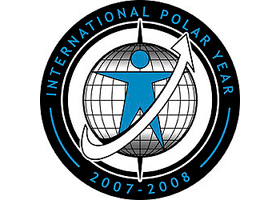
An interdisciplinary research initiative, entitled “The International Polar Year” (2007-2008) is of great importance for further development of the global polar research infrastructure. This initiative was a sort of a super project that consolidated the efforts of research teams and scientists from different countries, and created its own international research infrastructure (websites, new databases, etc.).
There are several major elements of the global research infrastructure that are capable of really advancing our research. One of such elements is the International Arctic Social Sciences Association, which, every three years, assembles massive international congresses with a very broad theme. Another element is the regular report on the socio-economic development of the Arctic, which is being developed at the initiative of the Arctic Council (the first time was in 2002, now in 2012-2014). The third element includes projects on social indicators, such as the Econor Project and the ArcticStat Project and the database. All of them are designed to consolidate the efforts of social scientists of polar countries and develop a uniform methodology for observing the socio-economic processes taking place in the Arctic. This is a fascinating prospect!
The initiative on establishing the international University of the Arctic as a new kind of institution that would be primarily virtual in nature, but with a real staff, courses, interdisciplinarity, etc., should be mentioned as well.
Two paradigms of organizing Russian Arctic research
Modern polar researches are largely international in nature. They go beyond a single country and are carried out by international research teams, and joint efforts of several countries, institutions and organizations. This means that they act as a network, necessitating a competent harmonization and coordination of efforts and operational communications for their initiation and conduct.
As practice shows, Russian response to these challenges is absolutely inadequate. Russian reaction to the initiative of foreign partners is unacceptably long. The transaction cost of forming Arctic partnerships is exceptionally high precisely due to Russian bureaucracy and lack of efficiency. Meanwhile, it is obvious that such partnerships cannot be complete without Russia’s participation as the largest Arctic country. There is another paradox: on one hand, Russia’s participation in international research polar projects is invariably and absolutely necessary, on the other hand, inclusion of Russia in these projects always greatly increases the size of coordination, harmonization, and communication related transaction costs.
As for polar research infrastructure, two approaches can be identified. The first approach is very expensive, proceeds from the recognition of the need to have a complete “gear” of all types of infrastructure – fleet, services, and ground observation networks. At its core is the old mentality related to the time when Russia independently held its polar explorations primarily for defense purposes.
The second approach is based on network interaction with international partners and sharing of costs of organizing Arctic research infrastructure. With this approach, Russia is fully involved in international projects, contributes to the organization and implementation of them. However, Russia’s own polar research under its national program is, at the same time, being minimized. This approach is a lot less costly, but requires a good negotiability and clear pursuit of national interests, so as not to be led by foreign partners, and to get the most out of its participation in international projects. This approach has its advantages and limitations.
It appears the choice of the second approach for Russia is predetermined both by developments in the world, and by the country’s present capabilities in terms of funding its Arctic researches. However, it should be recognized that Russia has not yet learnt how to bargain during organization of such research and to defend its national interests.
It turns out that the second paradigm has actually won in the dispute between the two paradigms of organizing modern scientific research in the Russian Arctic. Now, the right path is not to argue about the choice of strategy for the organization of national polar research, but to recognize the internationalization of research in the Arctic, which has already taken place, and refocus the main discussion emphasis on the defense of national interests and priorities within the framework of international projects, teams, and initiatives. Also, more and more of our own research initiatives are worth to be put forward based on international financial resources in order to close Russian gaps in researches.
Fleet and service certainly remain critical research infrastructure components in the Arctic. Here, the actual problem is on the creation of a new generation of research vessels (the previous one was laid in the 1960-1970s) and inclusion of polar service in world networks, which will force us to keep to international standards in this area.
Svalbard as a test
The Svalbard example shows how research activity and scientific presence is a guarantee of the country’s retention of sovereignty and jurisdiction over the polar areas. Today, research, and not military presence, is the key to Russia retaining control over the Arctic. This is true of Svalbard: not the economic presence of the company Arktikugol, but Russia’s research presence (through educational and research institutions) is key in terms of retaining this area within the Russian influence. Any international research document on the Svalbard endorsed by Russia must proceed from our recognition that the right to the widest possible (not just environmental) scientific activities on the island is a guarantee of maintaining our presence here. Russia must fight and defend this right in every possible way.
Current and future forms of scientific cooperation in the Arctic
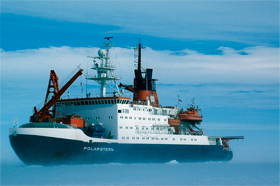
icebreaker of the Alfred Wegener
Institute for Polar and Marine Research
in Bremerhaven
In recent years, the following approach for organizing international polar research (organization of The International Polar Year became an exception) was adopted. There is a competent body – the Arctic Council – under which the priority issues of polar countries and their development prospects are discussed. The Arctic Council incorporates several international organizations that form the international science policy in the Arctic. Most notable among them are the International Arctic Science Committee (IASC) and the Arctic Council Sustainable Development Working Group. These structures are hired by the international scientific community of polar researchers to organize and hold researches, prepare regular research reports, and hold international conferences. Schematically, this can be represented as follows: the Arctic Council – the International Arctic Science Committee/Arctic Council Sustainable Development Working Group – international efforts towards addressing science policy priorities, designed by these bodies.
Let us dwell on the initiative of The International Polar Year, which reflected the tradition of integrated research, laid down back in the XIX-XX centuries, long before the Arctic Council was created, and was completely out of control of the Arctic Council. Nevertheless, dialogue was established between the structures of the Arctic Council and The International Polar Year. In other words, the scientific community was able to avoid manifestations of jealousy and indifferent attitude towards outsider’s initiatives.
It should be noted that the emergence of the Arctic Council research structures, as well as the activities of the Arctic Council as a whole, helped in strengthening the social vector of polar research, which was previously not observed to such an extent. In the future, the social dimension of international research projects in the Arctic will only increase.
The current cooperation in the Arctic, compared to the situation two decades ago, is more global and dynamic. The range of the Polar Research member countries has widened (it is now composed of not only polar countries), while results have become more visible. The level of technology intensiveness has also increased significantly.
What can we expect in the future? International cooperation in the Arctic is likely to witness further development of trends already identified – globalization, interconnection of various disciplines, and socialization. Globalization means the inevitable involvement of an increasing number of non-polar states in Arctic research. Interconnection of various disciplines refers to the growing need for the organization of complex research in the Arctic, consolidating the efforts of representatives of the social and natural sciences. Socialization refers to the further strengthening of the social vector, mainly focusing most of this research towards people’s needs and requirements.
The following can be perspective forms of scientific cooperation: strengthening the role of non-government structures in international polar cooperation; closer coupling of scientific polar research and intellectual business services in the form of Arctic consulting for government agencies and business structures; development of special Arctic tourism with the most powerful scientific component (visit to Svalbard, North Pole, northern native villages and towns); revival of old forms of research expeditions to the Arctic on a new basis, using new technological, transport and communication facilities.
In conclusion, let us propose an algorithm to optimize Arctic research management.
- New priorities for state polar research, which would take into account international and Soviet practices, should be identified in the annual report of the Expert Council on the Arctic and Antarctic chaired by the Federation Council of the Federal Assembly of Russia.
- An Arctic research interagency working group under the Ministry of Education and Science of the Russian Federation to coordinate these researches in the medium term and to more actively transfer foreign best practices in Russia should be set up.
- For the new federal universities (University of the Arctic in Arkhangelsk, North-Eastern Federal University in Yakutsk) supervising the Arctic zone, the size of federal funding should be linked with the strengthening of the Arctic research efforts.
- A ten-year (five-year) research program on the development of the ideas of The International Polar Year is needed within the Russian Academy of Sciences (RAS). Adoption of the RAS Presidium’s new Arctic Interdisciplinary Program is advisable.
- Agreements between public corporations and the territories where such corporations are based should provide for a scientific component, precisely – a support for local Arctic research on a competitive or non-competitive basis. In coordination with other federal departments and agencies, the Ministry of Natural Resources should develop regulations on a model agreement between the resource corporation and the region (municipality) where the corporation is based in the North and in the Arctic, making provisions for the support of universal local polar research in such agreement.
- It is necessary to revive the idea of the Arctic Agreement inter-regional association, and write in its Charter a condition on the coordination of polar research to be made by the Russian Arctic federal constituencies, as one of the most important functions, along with the coordination of cargo delivery, harmonization of financial, budget, transport, and labor market policies, etc.
- The priority of Russian initiatives in international polar research can be secured through a detailed preliminary discussion of their direction, sequence, format at several scientific forums in Russia, including in its polar regions.
It is important to link Russian participation in international arctic research projects with Russia’s priority interests on the development of its Arctic zone. This is about using the best international practices in technologies used to ensuring the heat and energy security of Arctic villages, settlements, and towns, about new forms of marine insurance of passenger and freight traffic to increase transit through the Northern Sea Route, about the technologies involved in organizing geophysical activities on the Russian Arctic shelf, about the infrastructure development of oil and gas exploration in this shelf, etc.
Never before in human history has a change in the social and natural systems in the Arctic occurred so quickly. As a great Arctic power, Russia should give an adequate response to the challenge posed by unprecedented changes. The country will have to, relying on rich historical traditions and a thick layer of industrial development created over the decades of the twentieth century, radically modernize the Arctic research infrastructure, creatively make use of best practices, technologies, innovations of other polar countries, and subject international scientific cooperation to the development priorities of its Arctic zone.
(no votes) |
(0 votes) |


